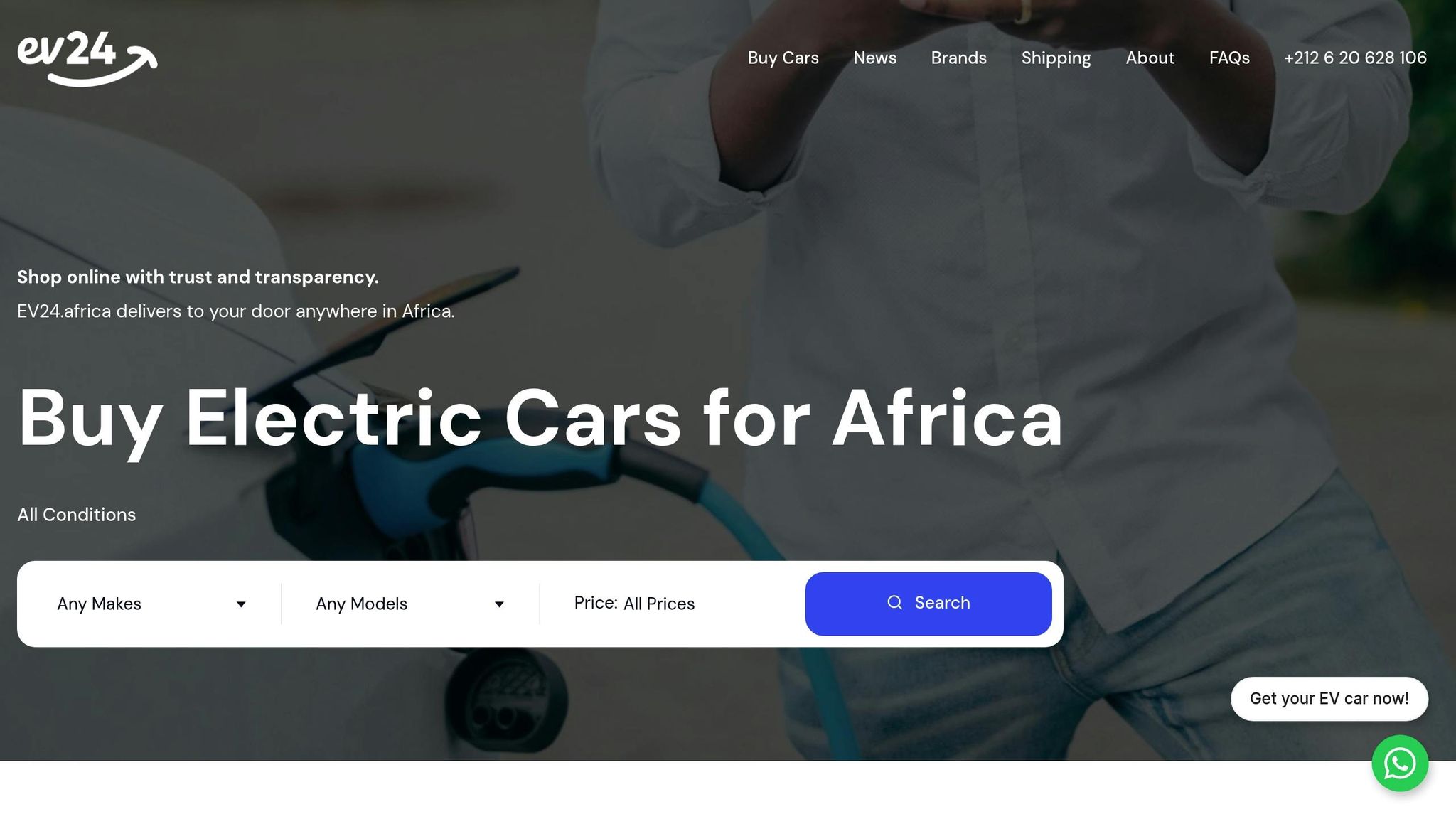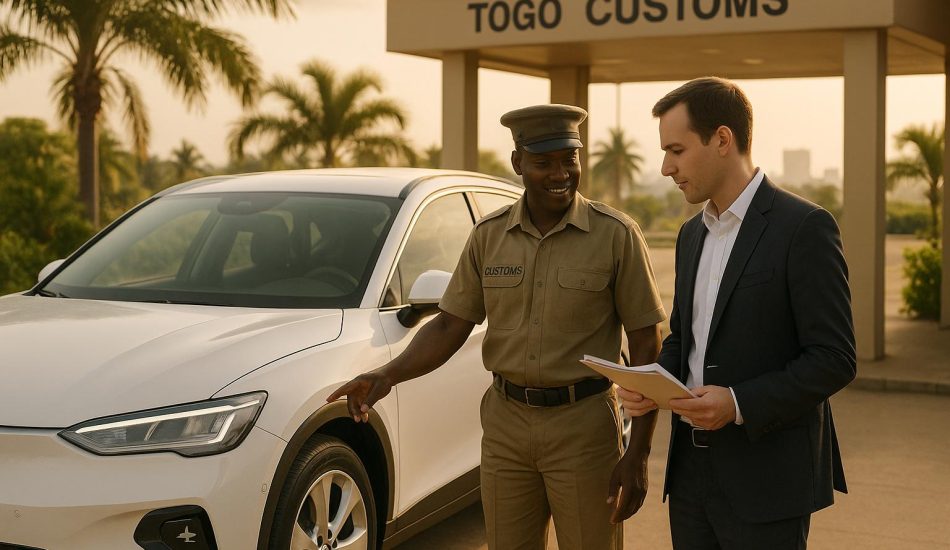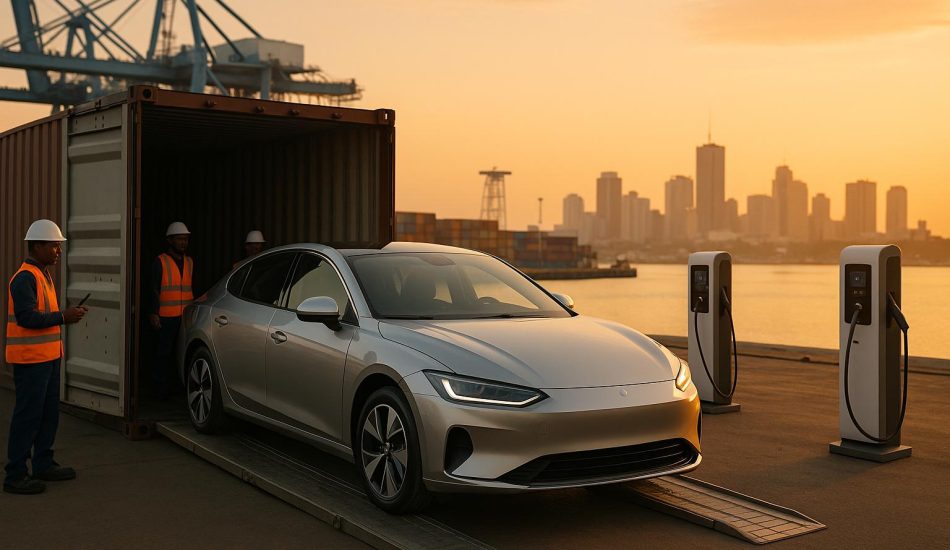
In July 2025, Mauritius implemented new rules for electric vehicle (EV) imports, increasing costs and removing prior incentives. Key changes include:
- Excise Duties Introduced: EVs up to 180 kW now face a 15% duty, while those above 180 kW are taxed at 25%. Previously, EVs were duty-free.
- Rebates Discontinued: The Rs 200,000 rebate under the Negative Excise Duty Scheme ended on June 30, 2025.
- Higher Registration Fees: First-time vehicle registration fees increased by 30%.
- Motor Vehicle License (MVL) Subsidy Removed: EV and hybrid owners must now pay the full annual MVL fee, ranging from Rs 200 to Rs 4,000 ($4.50–$90).
- Stricter Import Rules: Second-hand vehicles need an import permit, and only right-hand drive vehicles are allowed.
These changes significantly raise the cost of importing EVs, making them less financially attractive. For example, a Rs 2,000,000 ($45,000) EV under 180 kW now incurs Rs 300,000 ($6,750) in excise duties, with no rebate to offset the cost. Importers and buyers must carefully plan for these higher expenses.
The government justifies these measures as efforts to reduce road congestion and address the trade deficit, but industry leaders warn they may hinder the EV market’s growth in Mauritius.
New EV Import Regulations in Mauritius
Major Policy Changes
Big changes are coming to the way vehicles are imported into Mauritius. Starting in July 2025, the government is rolling out new rules that shake up taxation and registration policies for electric and hybrid vehicles.
Here’s the breakdown: excise duty exemptions for electric and hybrid vehicles are gone. Instead, electric vehicles (EVs) now face a 15% duty for models with power up to 180 kW and a 25% duty for models exceeding 180 kW. On top of that, excise and customs duties on imported gasoline and diesel passenger vehicles have doubled – from 45% to a steep 100%. Registration fees for all new vehicles are also jumping by 30%.
Another big shift is the removal of the 50% concessional rate for hybrids and EVs. Now, all vehicles must pay the standard Motor Vehicle License (MVL) fee, which ranges from $4.50 to $90 (Rs 200 to Rs 4,000) annually.
Import rules are tightening, too. Second-hand vehicles now require an import permit from the Ministry of Commerce and Consumer Protection. Age limits remain strict: gasoline-powered vehicles must be less than 3 years old, and diesel vehicles must be under 4 years old. Plus, only right-hand drive vehicles are allowed for import. These changes are set to have an immediate impact on both the costs and operations of EV importers.
Effects on EV Importers
For EV importers, these new regulations are a game-changer. The elimination of rebates and added duties means importers now face significantly higher upfront costs across all vehicle categories.
The competitive edge that EVs once had over gasoline and diesel vehicles is shrinking fast. With the cost advantage reduced, consumer demand for EVs could take a hit. This creates a ripple effect, increasing financial risks for importers who are already grappling with higher costs.
Importers also have to navigate stricter controls, which are being justified on grounds like health, security, and environmental protection. The new duty system, which varies based on vehicle specifications and power output, forces businesses to rethink their strategies and adapt to a more complex and costly import landscape.
Government Incentives and Tax Changes
The recent updates in government policies, combined with the new import regulations, have drastically altered the financial dynamics for electric vehicle (EV) importers and buyers.
Discontinued Incentives
Several key incentives that once made EVs more affordable in Mauritius have been removed. The Negative Excise Duty Scheme, which provided rebates to EV buyers, officially ended on June 30, 2025. This program had been available to both individual and corporate buyers.
Another major change is the elimination of the 50% subsidized rate for Motor Vehicle Licence (MVL) fees. Previously, owners of hybrid and electric vehicles enjoyed a discount, paying only half of the standard annual fee. Now, they are required to pay the full rate.
These changes are accompanied by new excise and registration fee policies, which have further increased the costs associated with vehicle imports.
New Excise Duty and Registration Fees
A new tiered excise duty system has been introduced, based on the power output of vehicles. Electric vehicles with power up to 180 kW now face a 15% excise duty, while those exceeding 180 kW are subject to a 25% duty. This is a complete shift from the previous policy, where EVs were exempt from excise duties.
Hybrid vehicles are also affected. Non-plug-in hybrids now face excise duties ranging from 25% to 75%, depending on engine capacity, while plug-in hybrids incur rates between 15% and 55%. Additionally, first-time registration fees have increased by 30%, further raising upfront expenses. Even conventional gasoline and diesel vehicles have not been spared, with their excise and customs duties rising to rates between 45% and 100%.
Before and After Incentive Comparison
| Incentive Type | Previous Policy | New Policy (2025) | Impact |
|---|---|---|---|
| Negative Excise Duty Rebate | Rs200,000 rebate available | Abolished | Loss of Rs200,000 benefit |
| Excise Duty on EVs ≤180 kW | 0% (exempt) | 15% | New 15% tax burden |
| Excise Duty on EVs >180 kW | 0% (exempt) | 25% | New 25% tax burden |
| MVL Fee Subsidy | 50% discount | Full standard rate | Loss of ongoing discount |
| Registration Fees | Standard rate | 30% increase | Higher upfront cost |
For example, consider a buyer purchasing an electric vehicle under 180 kW priced at Rs2,000,000 (around $45,000). Under the previous policy, this buyer would have benefited from a Rs200,000 rebate and paid no excise duty. However, with the new rules, the same vehicle incurs a 15% excise duty – about Rs300,000 (roughly $6,750) – and the rebate is no longer available. This results in an overall cost increase of approximately Rs500,000 (around $11,250).
As Prime Minister Navin Ramgoolam explained, these changes are intended to address "reducing road congestion and addressing the country’s trade deficit". However, the new policies have drawn criticism from industry experts. Mrinal Teeluck, Secretary-General of the Motor Vehicle Dealers Association (MVDA), commented:
"These changes are a heavy blow for vehicle importers… The increased duties and reintroduction of taxes on electric and hybrid cars will slow down the shift toward greener vehicles".
The timing of these policy updates is particularly striking, given that Mauritius achieved an 18.2% renewable energy contribution in its electricity mix in 2024. While the government’s focus seems to be on fiscal matters, critics argue that these measures could hinder the country’s progress toward a greener energy future.
Complete EV Import Cost Breakdown
Importing an electric vehicle (EV) to Mauritius involves navigating a range of mandatory fees and charges. The 2025 policy updates have reshaped the cost structure, making it essential for buyers to carefully plan their budgets.
Main Import Costs
Several key expenses come into play when importing an EV. One of the most notable changes lies in the excise duties. For vehicles with a power output up to 180 kW, the excise duty is 15%, while those exceeding 180 kW are taxed at 25%. Additionally, the Value Added Tax (VAT) remains at 15% for all EVs, calculated on the vehicle’s assessed value after customs.
Beyond these taxes, buyers need to account for customs fees, which vary based on the vehicle’s declared value, and registration fees, which have increased by 30% for first-time registrations. Other expenses, such as shipping, transit insurance, and administrative charges for customs clearance and documentation, also contribute to the total cost. These upfront fees set the stage for ongoing costs, particularly in vehicle licensing.
Road Motor Vehicle License Fee Updates
Changes to the annual Road Motor Vehicle License (RMVL) fees have further impacted EV owners. Previously, hybrid and electric vehicles benefited from a 50% discounted rate, but that subsidy has been eliminated. The RMVL fees now range from Rs 200 to Rs 4,000 annually, depending on the vehicle type and specifications.
Without the discount, EV owners now pay the full RMVL fee, potentially doubling their yearly licensing costs.
Total Costs by EV Type
The combined impact of these fees creates distinct cost profiles for different EV categories. Here’s a breakdown:
| EV Power Category | Excise Duty | VAT | Registration Fee Impact | Annual RMVL Fee Range |
|---|---|---|---|---|
| Up to 180 kW | 15% | 15% | 30% increase | Rs 200 – Rs 4,000 |
| Above 180 kW | 25% | 15% | 30% increase | Rs 200 – Rs 4,000 |
For example, importing a mid-range electric sedan valued at Rs 1,500,000 (approximately $33,750) with a power output under 180 kW would incur a 15% excise duty, totaling Rs 225,000 (around $5,063), and a 15% VAT of the same amount. Adding the increased registration and RMVL fees further raises the overall cost.
On the other hand, importing a high-performance electric SUV valued at Rs 3,000,000 (about $67,500) with a power output above 180 kW would result in a 25% excise duty of Rs 750,000 (around $16,875) and a 15% VAT of Rs 450,000. This brings the total tax burden to Rs 1,200,000 (approximately $27,000), excluding additional registration and licensing fees.
Adding to this financial strain, the removal of the Rs 200,000 rebate previously available under the Negative Excise Duty scheme further increases costs across all EV categories.
These examples highlight how the 2025 policy changes have significantly increased the financial commitment required to import an EV into Mauritius, impacting both upfront expenses and ongoing fees. Buyers need to carefully evaluate these costs when planning their purchase.
sbb-itb-99e19e3
EV Import Process: Step-by-Step Guide
Bringing an electric vehicle (EV) into Mauritius involves careful planning and coordination with government agencies. Staying on top of timelines and ensuring all required documents are submitted can help you avoid unnecessary delays.
Required Documents
To get started, you’ll need to gather the necessary paperwork as outlined by the Mauritius Revenue Authority (MRA) and Customs. A key document is the Customs Declaration (Bill of Entry), which must include the vehicle’s assessed value in Mauritian Rupees.
If you’re importing a used EV, you’ll also need an import permit before shipping the vehicle. It’s a good idea to start the permit application process 4–6 months in advance. Additionally, all importers must register with the MRA and Customs Department. If you’re working with a customs broker or freight forwarding agent, ensure they are registered with Customs before hiring them. Depending on the vehicle’s specifications, you may also need extra permits under the Consumer Protection (Control of Imports) Regulations 2017.
Once your documents are in order, you can move on to the import procedures.
Import Procedures
When your vehicle arrives at a Mauritian port, you’ll have 30 days from the purchase date to submit your Customs Declaration and any claims for negative excise duty. This declaration must include the vehicle’s customs value in Mauritian Rupees. Keep in mind that all imported goods are subject to the standard VAT. A registered customs broker typically handles the clearance process.
During customs clearance, officials will check the vehicle and its documents to ensure compliance. If you’re claiming duty exemptions, make sure to submit all supporting documents within 15 days.
After customs clearance, the next step is to register and license your EV.
Vehicle Registration and Licensing
Once your vehicle clears customs, you’ll need to register it with the National Land Transport Authority (NLTA). The NLTA is working toward fully digitalizing its registration services, and a new decentralized center in Phoenix is expected to be operational by September 2025. Road tax payments are now processed exclusively online through MauPass. Before making your payment, double-check the vehicle details and fees, and keep a copy of your receipt for your records.
After payment and document verification, the NLTA will issue your registration and license plates. If you prefer, specialized services can handle the entire process for you, from customs clearance to final registration. Keep in mind, however, that the total time required may vary depending on how complete your documents are and other processing factors.
How EV24.africa Helps with Mauritius EV Imports

Navigating the updated rules for importing electric vehicles (EVs) into Mauritius can be tricky, but that’s where EV24.africa steps in. They offer a full-service solution, handling everything from sourcing your EV to delivering it to your doorstep.
With a team of over 200 professionals spread across five African countries and partnerships in more than 40 nations, EV24.africa ensures a seamless import process for buyers in Mauritius. Their extensive network and expertise provide the support you need to make the switch to an electric vehicle.
Wide Range of EV Options
EV24.africa offers access to over 200 EV models from 25+ global brands, many of which are not available locally. By working with global suppliers, the platform ensures buyers can choose from the latest EV technologies at competitive prices.
Some of the popular brands available include Tesla, BYD, Leapmotor, ROX, Dongfeng, Geely, Hyundai, Toyota, and Suzuki. Whether you’re after a compact car for city driving or a luxury SUV, there’s something to suit every budget and preference. For buyers in Mauritius, who previously had limited options, this variety is a game-changer.
The platform also provides detailed specifications and transparent pricing for each vehicle, making it easy to compare models and make well-informed decisions. With everything in one place, there’s no need to juggle multiple suppliers or deal with the complexities of importing different brands.
Transparent Pricing and Flexible Financing
One of the toughest parts of importing a vehicle is figuring out the total cost. EV24.africa makes this simple by offering clear pricing and delivery details, so you know exactly what you’re paying for. They also provide flexible financing options, making it easier to fit your purchase into your budget.
"Africa is ready for electric vehicles, and EV24.africa is committed to making this transition smooth and accessible. Our goal is to provide a reliable, transparent, and competitive marketplace for EV buyers across the continent." – Axel Peyriere, Co-Founder and CEO of AUTO24.africa
Their pricing structure includes all the key costs associated with importing to Mauritius, helping buyers avoid unexpected fees. This clarity is especially valuable given the changes to excise duties and registration fees outlined earlier in this guide.
Buyers can even request a comprehensive quote for the entire import process, making it easier to plan financially. This level of transparency ensures a stress-free experience from start to finish.
Delivery and Comprehensive Support
EV24.africa takes care of the logistics so you don’t have to. They manage shipment options, customs clearance, and real-time tracking, all while using Incoterms to ensure clarity and reliability. Vehicles are typically delivered through Port Louis Harbor, with options for port-to-port or door-to-door delivery.
Buyers can choose between RoRo (Roll-on/Roll-off) and container shipping, depending on their needs. The platform also handles customs clearance, registration, and import taxes, ensuring compliance with Mauritius’ regulations.
A dedicated customer support team is available every step of the way, helping with everything from selecting the right vehicle to completing the registration process. Plus, with real-time shipment tracking, you’ll always know where your vehicle is and when to expect its arrival.
Conclusion: EV Imports in Mauritius for 2025
The year 2025 brings a shift in the electric vehicle (EV) import landscape for Mauritius, presenting both hurdles and opportunities for potential buyers. Key changes include the discontinuation of rebates and subsidies, alongside a 30% increase in registration fees. For those considering EV ownership, understanding these added costs is crucial for planning and maximizing long-term benefits.
Navigating the updated regulations demands precision and preparation. The Mauritius Revenue Authority (MRA) now emphasizes accurate documentation, with errors potentially leading to delays or penalties. This means buyers must be meticulous in their approach, ensuring all paperwork aligns with the new requirements.
Key Changes for 2025 EV Imports:
- Reintroduction of excise duties, increasing upfront costs
- One-time registration fees
- Stricter customs documentation requirements
- Revised RMVL fees ranging from Rs 200 to Rs 4,000
In this evolving environment, expert guidance is more important than ever. Platforms like EV24.africa simplify the import process by offering transparent pricing, professional advice, and end-to-end support. With a network of over 200 experts spanning five African countries and partnerships in over 40 nations, EV24.africa provides both local expertise and global connections to help buyers navigate these changes effectively.
The government’s updated policies reflect a broader commitment to addressing road congestion and reducing the trade deficit, aligning with its vision for sustainable transportation. While the new regulations may seem daunting, careful planning and collaboration with experienced import professionals can help buyers seize opportunities in the growing EV market while contributing to Mauritius’s environmental objectives.
FAQs
How will the new excise duties and removal of rebates affect the cost of importing an electric vehicle to Mauritius in 2025?
The cost of importing electric vehicles (EVs) to Mauritius is set to rise in 2025 due to the removal of rebates and the introduction of excise duties. These duties will range between 15% and 25%, depending on the vehicle’s engine power. Additionally, registration fees will see a 30% increase, starting in July 2025. This marks a sharp departure from the previous benefits of exemptions and rebates that EVs enjoyed in earlier years.
For those planning to import EVs, these changes translate to higher upfront expenses, including increased taxes and fees. It’s crucial to understand these new policies to effectively budget and assess whether transitioning to an EV remains a financially viable option in Mauritius.
What are the main steps and documents needed to import an electric vehicle into Mauritius under the 2025 regulations?
To bring an electric vehicle into Mauritius under the 2025 regulations, here’s what you’ll need to do:
- Get an import permit: Apply for this through the Ministry of Commerce and Consumer Protection before shipping your vehicle.
- Submit a Customs Declaration: Use the TradeNet system to file your declaration, often referred to as the Bill of Entry.
- Gather required documents: These include the purchase invoice, export certificate, Bill of Lading, and insurance certificate.
Once your vehicle arrives, you’ll need to handle customs clearance and registration. Double-check that all your paperwork is accurate and compliant to avoid unnecessary delays. This process aims to make EV imports smoother while encouraging greener transportation options in Mauritius.
How will Mauritius’ 2025 EV import rules impact electric vehicle adoption, considering higher costs and stricter regulations?
The 2025 EV import rules in Mauritius are set to make owning an electric vehicle more expensive. These changes include higher taxes, the return of import duties, and increased registration fees. Coupled with the removal of subsidies, these adjustments could slow down EV adoption in the short term by making them less financially appealing for both buyers and importers.
That said, the bigger picture still holds promise. Over time, the advantages of electric vehicles – like lower running costs, better energy efficiency, and a smaller carbon footprint – could drive adoption as people and businesses adjust to the new landscape. While the upfront costs may feel like a hurdle, the shift to EVs is in step with global efforts to prioritize sustainability and cleaner energy options.




